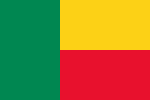
Benin, officially the Republic of Benin, and also known as Dahomey, is a country in West Africa. It is bordered by Togo to the west, Nigeria to the east, Burkina Faso to the north-west, and Niger to the north-east. The majority of its population lives on the southern coastline of the Bight of Benin, part of the Gulf of Guinea in the northernmost tropical portion of the Atlantic Ocean. The capital is Porto-Novo, and the seat of government is in Cotonou, the most populous city and economic capital. Benin covers an area of 114,763 km2 (44,310 sq mi), and its population in 2021 was estimated to be approximately 13 million. It is a small, tropical country. It is one of the least developed, with an economy heavily dependent on agriculture, and is an exporter of palm oil and cotton. Some employment and income arise from subsistence agriculture.
The History of Benin since the 16th century, for the geographical area included in 1960 in what was then called the Republic of Dahomey before becoming the People's Republic of Benin.

The Politics of Benin take place in the framework of a presidential representative democratic republic, wherein the President of Benin is both head of state and head of government, and of a multi-party system. Executive power is exercised by the government. Legislative power is vested in both the government and the legislature. The Judiciary is independent of the executive and the legislature. The current political system is derived from the 1990 Constitution of Benin and the subsequent transition to democracy in 1991. The Economist Intelligence Unit rated Benin a "hybrid regime" in 2022.

The Bight of Benin or Bay of Benin is a bight in the Gulf of Guinea area on the western African coast that derives its name from the historical Kingdom of Benin.

The Catholic Church in Benin is part of the worldwide Catholic Church, under the spiritual leadership of the Pope in Rome.

The Benin national football team, nicknamed Les Guépards , represents Benin in men's international association football and are controlled by the Benin Football Federation. They were known as Dahomey until 1975, when the Republic of Dahomey became Benin.

Thomas Boni Yayi is a Beninese banker and politician who was the president of Benin from 2006 to 2016. He took office after winning the March 2006 presidential election and was re-elected to a second term in March 2011. He also served as the chairperson of the African Union from 29 January 2012 to 27 January 2013.

Global Young Greens (GYG) is an emerging global organisation supporting and consolidating the efforts of young people working towards social justice, ecological sustainability, grassroots democracy and peace. GYG is a joint project of over 70 youth organisations and many hundreds of individuals, including the Federation of Young European Greens, Asia Pacific Young Greens Network, Cooperation and Development Network Eastern Europe, Young Volunteers for the Environment and others. GYG is a non-profit organisation under Belgian law.
Trade unions in Benin operate in relative freedom, with approximately 75% of the formal sector being unionized. There are, however, concerns expressed by the International Labour Organization (ILO) and the International Trade Union Confederation (ITUC) about the discrepancies between the government's Labour Code and the labour practices outlined by ILO Conventions 87 and 98 - specifically the right of unions to form without government approval, the right of seafarers to organize or strike, and restrictions on strikes.

Christians in Benin constitute approximately 48.5 of the country's population.
The Constitution provides for freedom of religion, and the Government generally respected this right in practice. There were no reports of societal abuses or discrimination based on religious belief or practice, and prominent societal leaders took positive steps to promote religious freedom.

The following outline is provided as an overview of and topical guide to Benin:

Christianity is the largest religion in Benin, with substantial populations of Muslims and adherents of traditional faiths. According to the most recent 2020 estimate, the population of Benin is 52.2% Christian, 24.6% Muslim, 17.9% traditionalist and 5.3% follows other faiths or has no religion.

Benin is a diverse country linguistically. Of those, French is the official language, and most of the indigenous languages are considered national languages.
Benin, officially the Republic of Benin, is a country in Western Africa. It borders Togo to the west, Nigeria to the east and Burkina Faso and Niger to the north; its short coastline to the south leads to the Bight of Benin. Its size is just over 110000 km2 with a population of almost 8500000. Its capital is the Yoruba founded city of Porto Novo, but the seat of government is the Fon city of Cotonou. About half the population live below the international poverty line of US$1.25 per day.

The human-rights situation in Benin is considered to be generally above average for sub-Saharan Africa.
The Protestant Methodist Church in Benin was founded by Methodist missionary and colonial official in West Africa, Thomas Birch Freeman in 1843. He was sent by the Methodist Missionary Society in London. Freeman was the son of a freed slave.

Patrice Guillaume Athanase Talon is a Beninese politician and businessman who has been president of Benin since 6 April 2016.
Parliamentary elections were held in Benin on 8 January 2023 to elect all 109 members of the National Assembly. The preliminary results of the election were announced on 11 January. The result was a victory for parties supportive of President Patrice Talon, the Progressive Union and Republican Bloc, which together won 81 of the 109 seats.










